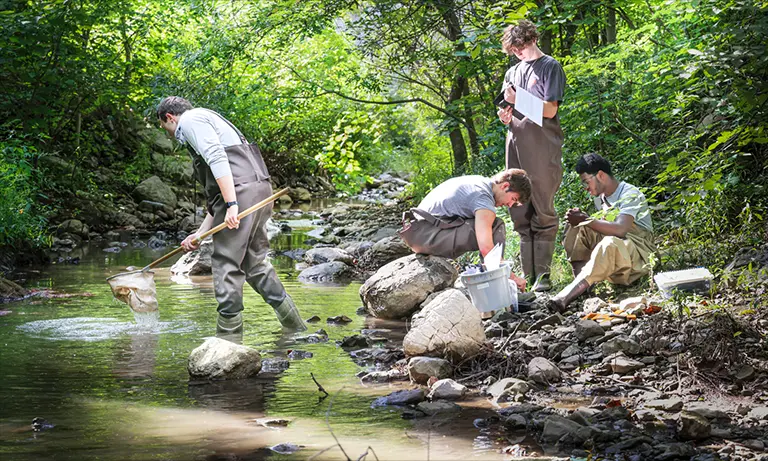
Curriculum
The environmental challenges we face require creative thinking to solve. Through the Environmental Science program at Hobart and William Smith, you'll blend perspectives from biology, geoscience, and environmental studies to understand the science of environmental problems. In addition to developing a firm grounding in science, our curriculum equips you with the skills to address stakeholder values and effectively engage with policymakers, preparing you to make a meaningful impact on environmental issues.
Curriculum Features
Studying Environmental Science at Hobart and William Smith, our program:
- Features a scientific understanding of environmental problems integrating ideas from biology, geoscience, and environmental studies.
- The ability to choose your electives in a variety of programs, including Biology, Chemistry, Data Analytics, Geoscience, Physics and more.
- The opportunities to conduct research at our nearby natural resources including Coopers Woods, Seneca Lake, the Hanley Preserve and through the Finger Lakes Institute.
- Allows for you to study abroad while you progress through the major.
what you'll learn
Through the Environmental Science program, you'll:
- Gain a deep understanding of the forces altering our ecosystems and explore potential solutions.
- Acquire skills to design and conduct scientific studies, including hands-on courses in data analysis and geospatial analysis.
- Effectively communicate science in different formats and different venues.
- Integrate insights from the social sciences and humanities to address equity, justice, and ethical issues with regards to human-environment interactions.
careers
After graduating with a degree in Environmental Science, you'll be ready for a career in different fields like:
- Natural resource management
- Environmental consulting
- Sustainability initiatives
- Environmental policy
Courses
course requirements
Sixteen courses are required to complete the Environmental Science (B.S.) major.
Seven core courses:
- BIOL 167 Introductory Biology
- BIOL 225 Ecology
One of the following introductory Geoscience courses:
-
- GEO 182 Introduction to Meteorology
- GEO 184 Introduction to Geology
- GEO 186 Introduction to Hydrogeology
- ENV 200 Environmental Science
One of the following social science courses:
-
- ENV 201 Community and Urban Resilience
- ENV 205 Introduction to Environmental Law
- ENV 237 Environmental Justice in Indian Country
One of the following humanities courses:
-
- ENV 202 Environmental Humanities
- ENV 245 Radical Environmentalism
- ESCI 400 Capstone Experience
Two courses in quantitative and spatial reasoning:
One of the following statistics courses:
-
- ENV 207 Environmental Statistics
- BIOL 230 Biostatistics
One of the following courses in geospatial analysis:
-
- ENV 203 Fundamentals of GIS
- ENV 281 Remote Sensing
Five environmental science electives:
Choose two Biology and three Geoscience courses from the following list:
Biology Electives
|
BIOL 300 Evolution |
BIOL 334 Vertebrate Biology |
|
BIOL 310 Conservation Biology |
BIOL 338 Aquatic Biology |
|
BIOL 325 Invasion Ecology |
BIOL 339 Global Change Biology |
|
BIOL 328 The Biology of Plants |
BIOL 356 Ornithology |
Geoscience Electives
|
GEO 210 Environmental Hydrology |
GEO 325 Paleoclimatology |
|
GEO 215 Hydrometeorology |
GEO 330 Limnology |
|
GEO 220 Geomorphology |
GEO 350 Synoptic-Dynamic Meteorology I |
|
GEO 242 The Earth System |
GEO 351 Synoptic-Dynamic Meteorology II |
|
GEO 250 Oceanography |
GEO 355 Mesoscale and Severe Weather |
|
GEO 255 Global Climates |
GEO 362 Polar Meteorology |
|
GEO 260 Weather Analysis |
GEO 365 Environmental Meteorology |
|
GEO 265 Weather Measurements and Computing |
GEO 375 Earth History |
|
GEO 280 Environmental Geochemistry |
GEO 380 Paleontology |
|
GEO 284 Mineralogy and Petrology |
GEO 390 Gondwana |
|
GEO 320 Sediments and Sedimentary Rocks |
ATMO 245 Climate Change Science |
Two supporting science electives:
Options include the following:
- Any course that counts towards a major in Biology, Chemistry, Computer Science, Geoscience, Mathematics, Physics
- Any of the following courses in Environmental Studies:
- ENV 203 Fundamentals of GIS
- ENV 281 Remote Sensing
- ENV 282 Energy, Environment and Technology
- ENV 310 Advanced GIS
- Any course that counts towards the minor in Data Analytics
progressing through the major
Students majoring in Environmental Science are advised to take the following courses:
First Year
- BIOL 167 Introductory Topics
- GEO 182 Introduction to Meteorology OR GEO 184 Introduction to Geology OR GEO 186 Introduction to Hydrogeology
- ENV 200 Environmental Science
- ENV 202 Environmental Humanities OR ENV 245 Radical Environmentalism
Second Year
- BIOL 225 Ecology
- ENV 201 Community and Urban Resilience OR ENV 205 Introduction to Environmental Law OR ENV 237 Environmental Justice in Indian Country
- ENV 207 Environmental Statistics OR BIOL 230 Biostatistics
- One Geoscience elective
Third Year
- ENV 203 Fundamentals of GIS OR ENV 281 Remote Sensing
- One Biology elective
- One Geoscience elective
- One supporting elective
Fourth Year
- One Biology elective
- One Geoscience elective
- One supporting elective
- ESCI 400 Environmental Science Capstone
